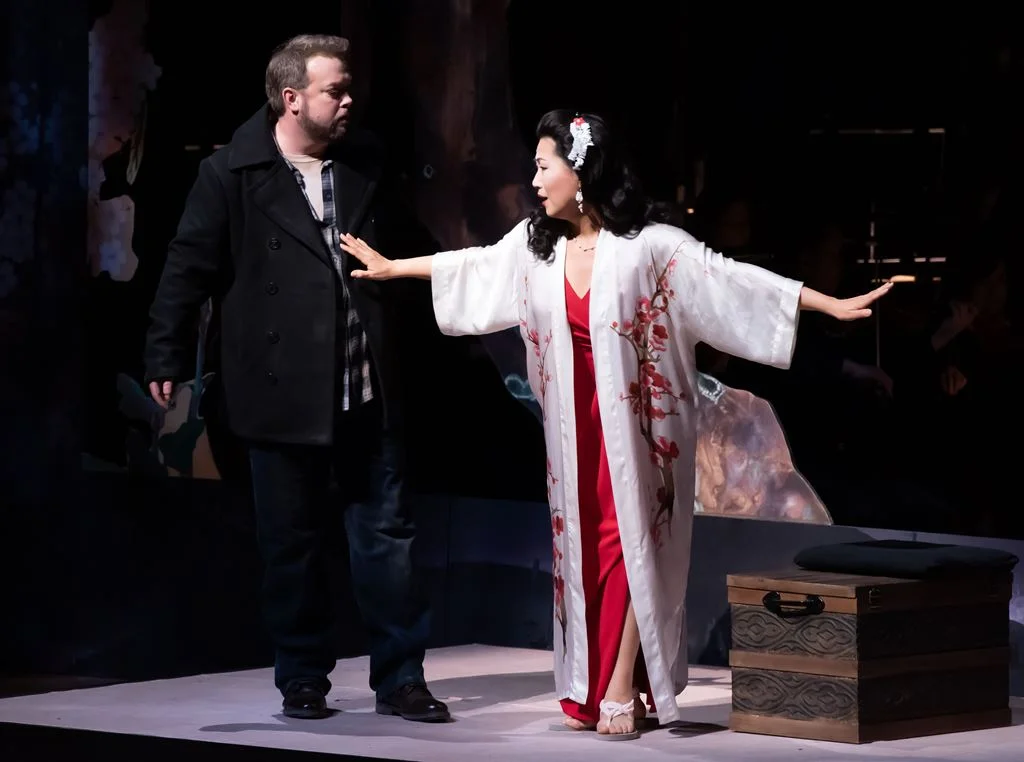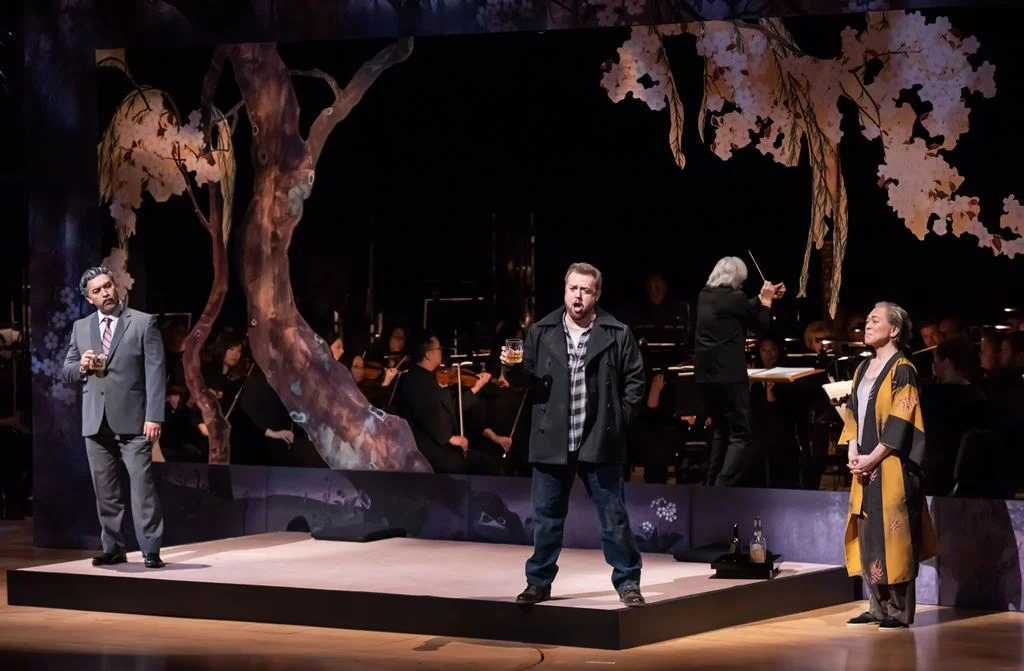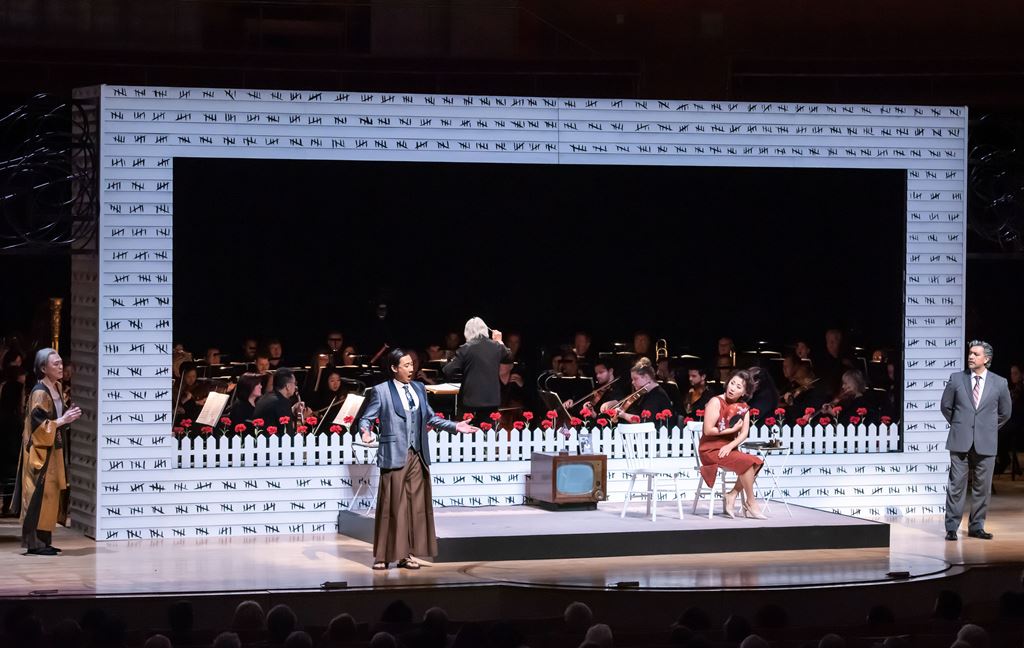Pacific Symphony’s “Butterfly” Soars to Tragic Heights
/By Truman C. Wang
2/24/2019
Photo credit: Pacific Symphony
Puccini called Madama Butterfly “the most modern of my operas”. 105 years after its 1904 La Scala premiere, the opera still remains timely and socially relevant today. Since 1904, there have been no fewer than four different versions of the opera, each seeking to prettify and soften the character of Pinkerton and elements of Nipponeria that so fascinated the Western colonialists of the time (In the U.K., the Boar War to colonize South Africa for its diamond mine had ended two years before the opera’s premiere.) As a result, by the time of the Paris Opéra-Comique performance in 1906 (today’s definitive version), the original Butterfly had had much of its wings clipped and ragged edges trimmed: a shortened wedding party, a sympathetic aria “Addio fiorito asil” and cutting of xenophobic remarks for the villain Pinkerton, extended orchestral music in the flower duet, rescoring of Cio-Cio-San’s entrance, etc. – so much so that Julian Smith, editor of the Ricordi critical edition of Butterfly, called this final version, “perilously close to sentimental melodrama”.
To the modern-day detractors of this ‘sentimental melodrama’ (“So sad, and so beautiful!”, remarked the great Licia Albanese), I can count the ways how much I love Butterfly above all other Puccini operas: its scoring subtlety, emotional honesty, formal structure (two acts are better than three), relevance to modern life. This Pacific Symphony staging has all the trappings of an opera house production, except the orchestra musicians sit on the stage (behind the sets) rather than in the pit – and they sound marvelous under Carl St. Clair’s vivid, musically and dramatically cogent conducting. Eric Einhorn, a veteran opera director, keeps the audience engaged and any weird ‘concept’ to the minimum: Cio-Cio-San and her entourage ‘hiking up’ from the auditorium onto the stage is a brilliant touch, as well as having the excellent Pacific Chorale singers act out their parts in the wedding party. The handsome circa-1950’s costumes and framing sets of Japanese cherry trees in Act I and American living room in Act II complete the pleasing visuals.
The assembled cast is not stellar, but very strong. As an Asian-American, my personal preference for the Cio-Cio-San role is an Italian lyric soprano in Asian makeup (pace social media haters): nothing beats the morbidezza and luminous tone of an Italian voice in an Italian opera. Too often in this politically-charged social climate, we lose sight of the traditional conventions and foibles of this Greatest Art Form, and how much more theatrically effective it would be if the composer is served. Since 1904, sopranos of every type have undertaken the role with varying degrees of success – from the nightingale type (Toti Dal Monte, Amelita Galli-Curci, Maria Callas), to the lyric (Nancy Storchio, Geraldine Farrar, Elisabeth Rethberg, Renata Tebaldi), and the heavyweights (Gretel Krusceniski, Emmy Destinn). In Costa Mesa, Korean lyric soprano Yunah Lee is a touching, detailed and delicate Cio-Cio-San, more adapt, perhaps, in emotional force and tragic power of Acts II and III than as a fifteen-year-old Geisha girl of Act I. Her “Un bel dì” offers an object lesson in phrasing and tonal coloring, but by the late hour of the cherry blossom duet, the voice has already lost much of its bloom.
The villainous Pinkerton of John Pickle sings lustily with pinched, unattractive high notes, in character if not in style. Mezzo-soprano Sabina Kim and baritone Luis Ledesma are dignified and sympathetic Suzuki and American counsel Sharpless, respectively. Rounding out the cast are Joseph Hu’s marriage broker Goro, Yunpeng Wang’s Prince Yamadori, Karin Mushegain’s Kate Pinkerton, and Annabella Chou as Cio-Cio-San’s little ‘bambino’.
One more performance remains on Tuesday February 26 8:00pm.
For those interested in learning more about the different Butterfly versions, I recommend the English National Opera Guide, No. 26, edited by Nicholas John. It provides the full original 1904 “Milan” text, with the subsequent cuts and revisions recorded in footnotes, and also includes John Luther Long’s story.
Truman C. Wang is Editor-in-Chief of Classical Voice, whose articles have appeared in the Pasadena Star-News, San Gabriel Valley Tribune, other Southern California publications, as well as the Hawaiian Chinese Daily. He studied Integrative Biology and Music at U.C. Berkeley.



